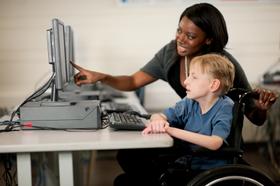Once the flurry of back-to-school time has settled, many parents face the challenge of keeping their kids in homework mode. Homework battles are a common issue during the school year, and some parents and students have more difficulty with this academic necessity than others. Since homework is here to stay for most students, it can be very beneficial for parents to learn how to help their children make the most of their homework time. While we shared 10 helpful homework tips before, here are 10 more homework strategies that help students make the grade.
Make Sure Their "Office" is Well Stocked
Think about what work environment is most productive for you. Is it a quiet place, free of distractions and stocked with all the supplies you need right at hand? For a child, homework is their "work," You can duplicate the same productive features for your child's office. Typically, children need a quiet, well-lit place to tackle homework assignments, where all their supplies are within arm’s reach. This area can be in the child’s bedroom, family office, or kitchen corner if that works best. Supply a desk light, paper, writing utensils, and any other supplies your child needs regularly.
Establish a Schedule
Homework is done best when it is completed at the same time of day whenever possible. Your family should set aside a specific time frame for homework assignments, with ample time for students to complete their work. For some, this might be right after school, while others might have more success in the hours after dinner. You and your child should decide the best time for homework.
Eliminate Distractions
Help your child focus on homework tasks by eliminating all distractions during homework time. This includes television, video games, electronic devices, and cell phones. Some families find that establishing a “quiet” rule for an hour or two during homework sessions makes the environment more conducive to productivity. If students want to listen to light background music during homework time, the white noise may be conducive to productivity, as we explored in our unconventional study habits article.
Teach Them about Organization
Don’t assume your children understand the finer points of keeping their assignments neat and organized. While this process may come naturally for some, many students need instruction on what organization looks like and how to set up their lockers, notebooks, and backpacks to keep things in order. Once you have an organized system, check it with your student weekly to ensure it is maintained.
Help Them Make a Plan
Time management is one of the most important lessons students learn through homework. When your student comes home from school, go over her assignments for the evening and help her create an action plan if necessary. If there are activities to juggle in the evening, teach your student to plan a time for homework around the activities to ensure everything gets finished.
Offer Assistance, Not Answers
While parents should be available to offer guidance and answer questions during the homework session, offering assistance is very different from simply feeding a student the answers. By giving them the answers, students are not learning to solve the problems independently. If they don’t understand your explanation of a concept, encourage them to talk to the teacher about additional help.
Stay Abreast of Teacher Expectations
Parents who know the teacher and what the teacher expects of students are better equipped to help their children in that class. Attend back-to-school nights and teacher conferences to learn firsthand what your student is learning and the classroom expectations. Many schools also post assignments and class rules online now, making it easy for parents to read up on what is happening in the classroom at any time.
Teach Hard, Then Easy
Encourage students to get challenging assignments out of the way before they tackle the easier ones. While it might be tempting to knock off fast, easy jobs first, the U.S. Department of Education recommends leaving those assignments until later. That way, students are most alert when they take on the more complex subject material, while accessible material can go faster even after they become tired of studying.
Check Over Homework Assignments
Parents can check over a student’s completed assignments each night. However, do not make corrections on the homework unless the teacher has said it’s acceptable for parents to do so. If your child struggles with a particular subject or concept, offer to help, him figure it out or encourage him to go to the teacher for additional assistance. Do not allow children to switch gears to recreational activities until the homework is checked and put away in the backpack for the next day.
Don’t Forget Positive Reinforcement
When parents and students begin to get bogged down in the homework routine, it can be easy to find yourself as a parent spending a significant amount of time and energy getting kids to focus and stay on task. Don’t forget to reinforce this process by praising children for completing tasks and staying on top of their studies. A positive attitude often goes beyond nagging or yelling when motivating kids to stick with their studies.
While homework can be a challenging part of any school year, it doesn’t have to be a source of ongoing stress for your family. With a few key strategies in place, you will be ready to help your students make the most of their homework time, so their new school year is as successful and positive as possible.
Questions? Contact us on Facebook. @publicschoolreview











